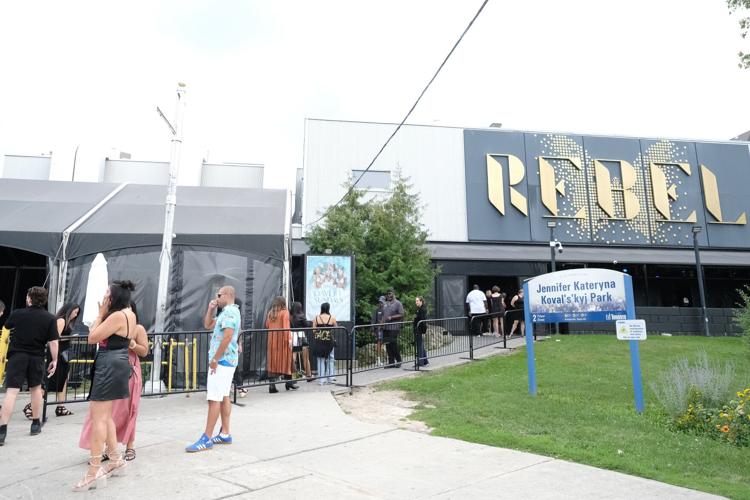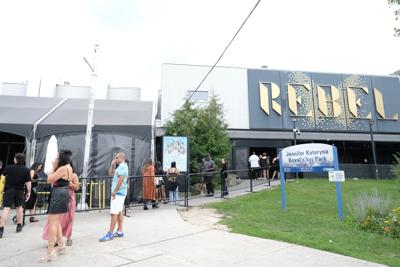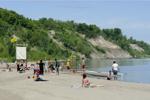At opposite ends of É«É«Ŕ˛â€™s eastern waterfront are two longtime adversaries.
On one side is the site of the Cabana Pool Bar, a daytime outdoor club owned by Maya Corp.ĚýwithĚýprivate cabanas, pools and DJs,Ěýinspired by resorts in Miami and Las Vegas. On the other side are the É«É«Ŕ˛ Islands, a unique urban oasis resembling a cottage-in-the-city lifestyleĚýand home to about 700 residents.
Though at their closest point they are only separated by a few football fields of water, they seem worlds apart.
On a recent Saturday evening themed as “É«É«Ŕ˛’s hottest Latin day party,” young adults danced at CabanaĚýto reggaeton and salsa music. Standing on the Polson Pier with its stunning view of the city skyline, the club’s music was all but drowned out by the wind and waves, as well as the speakers fromĚýcars and food trucks in the nearby parking lotĚýbumping Lloyd Banks’s “I’m So Fly” or 50 Cent’s “In da Club.”
Some island residents have no shortage of adjectives for the noise they have said isĚýcoming from the club in previous years: “Invasive, soul destroying, relentless, thundering, extraordinarily disturbing and outrageous,” to cite a few of the terms used at a recent tribunal hearing.
But a decision by a provincial tribunal to officially allow the club to play amplified music in its massiveĚýoutdoor patio and lounge, rejecting a ban Ontario’s liquor licensing agency wanted to impose,Ěýhas sparked an appeal by the city.
At the heart of the fight are questions over how much noise is too much — and who gets to decide what that means.
It’s been a tension between residents and theĚýsite for about 20 years, one that islanders say will likely worsen as É«É«Ŕ˛’s easternĚýwaterfront grows.
Noise ban ruled too restrictive
In June, the club’s owners convinced theĚýLicence Appeal Tribunal to refrain from enforcingĚýa that the Alcohol and Gaming Commission of Ontario (AGCO)Ěýwanted to add to one of Cabana Pool Bar’s liquor licences, a ban thatĚýhad already been a part of the business’sĚýotherĚýactive liquor licence since 2018.
The tribunal called a full-blown banĚý“overly restrictive” and “disproportional.”
It decided the club could have amplified outdoor music — or voices, or a disc jockey, or loudspeakers — until 11 p.m., as long as it complied with Ěýand loudspeakers didn’t exceed 70 decibels. The city claims in its appeal the tribunal applied municipal laws incorrectly and ignored provincial rules.
“In the years since Maya began operating at Polson Pier, É«É«Ŕ˛ has introduced noise bylaws with objective, decibel limits … (Our business) was just asking to be held to the same standard as everyone else operating in É«É«Ŕ˛,” Jamil Kamal said in a statement to the Star.Ěý
Kamal is a vice-president atĚýINK Entertainment Group, founded by nightclub tycoon Charles Khabouth, which oversees daily operations at Cabana and its adjoining indoor nightclub, Rebel, both owned by Maya Corp.
The tribunal granted Cabana’s request despite opposition from the city, some É«É«Ŕ˛ Island residents and the AGCO.
The AGCO argued it was trying to enforce theĚýLiquor Licence and Control Act, which it’s responsible for,Ěýby regulating noise “in the public interest,” given the site has a lengthy history of noise complaints under different owners. The act has an explicit prohibition on licensed “outdoor premises” making noise that would “disturb” nearby residents.
The AGCO has receivedĚý13Ěýcomplaints about Cabana since 2017.
The city, meanwhile, received between zero and 13Ěýnoise complaints annually between 2013 and 2020. The complaints then spiked dramatically, into the dozens, for two years, before sharply declining again.ĚýIt’s not clear why.
It’s also not clear from the data just how many people are complaining — or whether one person could potentially account for multiple complaints.
The residents directly involved in the case declined to talk to the Star. But Tony Farebrother, chair of the É«É«Ŕ˛ Islands Community Association, said the fight underscores the tension between the waterfront as an attractive place to live — and as a place to operate a business. (The association was not directly involved in the case,Ěýbut its noise subcommittee was.)Ěý
“Noise travels right across the water — there’s no barrier,” Farebrother said. “I really don’t think (the club) fits with the future of that area.”
Emerging developments such as the rentals at Quayside and the island neighbourhood onĚýOokwemin Minising are expected to add tens of thousands of residents to the area in the next decade.
Kamal, however, said the venue has been doing its best.
“Maya has made many investments in being a good neighbour,” Kamal said. “We have invested hundreds of thousands of dollars in a specialized sound system with unidirectional speakers that direct sound towards the venue, instead of in all directions.”
He said the club caters to a crowd that has been under-represented in the neighbourhoodĚýbut that is an increasing part of É«É«Ŕ˛’s diversity.

É«É«Ŕ˛ Island residents across the water from the Cabana Pool Bar have complained about noise that they say is coming from the club.
Michelle Mengsu Chang É«É«Ŕ˛ St“Cabana’s clientele, owners and personnel are largely from racialized backgrounds,” Kamal said. “Most of Cabana’s events feature electronic dance music. … It has roots in Black history, combining influences from the African American, Latino and queer communities that developed disco, with dance hall and reggae bass patterns, and other music influences.”Ěý
Policing noise can be tricky
A key point for the Licence Appeal Tribunal was trying to determine how much of the noise that’s disturbing island residents has been coming from Cabana — and how much comes from other sources in É«É«Ŕ˛’s busy harbour, such as party boatsĚýor venues near Cherry Beach.
The tribunal’s conclusion? It’s “debatable.”
It decided that sound from the club should be evaluated by noise decibel measurements set out in city bylaws, rather than what other Cabana-related hearings have done, which was to look at the number of noise complaintsĚýand apply the liquor licensing act’s noise prohibition.
However, in its appeal to Ontario’s Divisional Court in July, the city argues that the tribunal used an “incorrect legal standard” and “made serious errors in law” by choosing to rely on É«É«Ŕ˛â€™s bylaws rather than applying the province’s liquor licensing act.
The city’s noise bylaws sets out decibel limits for “outdoor living areas” such as residential porches or home decks andĚýCafĂ©TO patios, which are on public property, at 70 decibels.
The liquor act, on the other hand, explicitly bans outdoor establishments with liquor licences from making noise “directly or indirectly” from entertainment that would “disturb” nearby residents. The legislation doesn’t define disturbance, just that it needs toĚýhappen regularly.
The city argues that by applying municipal rules to Cabana, it sets a precedent that would allowĚýany licensed bar in É«É«Ŕ˛ to make noise at 70 decibels, regardless of whether it disturbs residents,Ěý“thereby altering the prohibition found in the (liquor licensing act) and imposing an unfair burden on the city and (local residents).”
In its appeal, the city cites other tribunal rulings over the years that involved Cabana, including one that called city bylaws “anĚýirrelevant regime of noise control” when it comes to dealing with liquor licences, which are primarily regulated by provincial rules and agencies.
Now, “a resident plagued by noise from an outdoor premises will be required to demonstrate, likely by hiring an expert witness with access to professional sound measurement tools, that the noise regularly exceeds 70 decibels to establish … that it ‘unreasonably’ disturbs them,” according to the city’s court filings.
Cabana’s owners mainly wanted to avoid a blanket ban on amplified music on its licence, according to court documents, becauseĚýin the past few years the sound engineers it hired found the new specialized speakers limit noise on the islands to 70 decibels.

The city is appealing a decision by a provincial tribunal to allow Cabana Pool Bar to play amplified music because of the precedent it sets.
Michelle Mengsu Chang É«É«Ŕ˛ St“If anyone is hearing noise on the island after 11 p.m., it is not coming from Maya’s venues,” Kamal said. “There is no outdoor amplified noise at 11 Polson Pier after 11 p.m. This has been true since 2008 and is one of the conditions on the licence that we did not ask to remove.”
A history of hearings and appeals
There’s a history of controversy over noise at 11 Polson under different owners. The site’sĚýliquor licence was revokedĚýin 2006 due to noise complaints when it was run by The Docks by Cherry, a separate entertainment complex.
Then in 2008, new owner Polson Pier Entertainment Inc. (which once operatedĚýthe concert hall Sound AcademyĚýat the site) was granted a new liquor licence with a set of conditions, includingĚýlimiting any amplified sounds to before 11 p.m. and ensuring noise was not “audible on Ward’s Island or Algonquin Island,”Ěýtwo of the É«É«Ŕ˛ Islands.Ěý
The site operated “relatively complaint free” until 2013, said the tribunal.
That’s when Maya took over, picking up the same licence with the same conditions, including stationing an employee on Ward’s Island to warn the business if the noise got too loud.
But in 2015, Powerhouse Corp., which is largely owned by Maya, applied for an entirely new liquor licence with less restrictive noise conditions. That application ultimately went to the tribunal, whichĚý,Ěýbut placed a blanket ban so that there could be “no amplified music on or directed toward any outdoor area.”
At this point, the site had two liquor licences, each with different conditions around amplified music.
Back in 2018, when the tribunal opted to enforce the ban, it said “noise attenuation over water is difficult and may be impossible.”
The tribunal also found the business’s sound control systems up to that point were “ineffective”Ěýbecause they were either ignored or DJs could override the limits.
Also, the islands’ community association didn’t tell its residents to take their complaints to the Cabana employeeĚýstationed on the island, according to the tribunals.
Despite a ban on amplified music on one licence, Cabana continued to host parties until 11 p.m. because its earlier liquor licence allowing it to do so was still in effect, according to the city’s appeal, whichĚýis now aiming to reinforce the ban on both licences.
Kamal noted the corporation never asked to change the current licence condition that completely cuts off amplified music at 11 p.m. — “an unusually harsh restriction” —Ěýbut one they didn’t dispute “out of deference” to island residents.
“TheĚýwaterfront has changed a lot since this battle started 20 years ago,” said Farebrother, the island resident. “This will be affecting a lot more people than just our little community.”






































To join the conversation set a first and last name in your user profile.
Sign in or register for free to join the Conversation